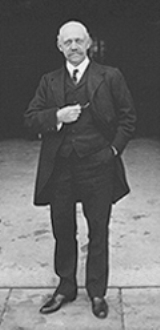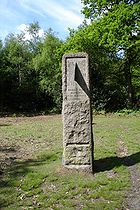
William Willett
Encyclopedia
William Willett was an English builder and a tireless promoter of British Summer Time
.
. After some commercial experience, he entered his father's building business, Willett Building Services. Between them they created a reputation for "Willett built" quality houses in choice parts of London and the south, including Chelsea
and Hove
, including Derwent House
. He lived most of his life in Chislehurst
, Kent
, where, it is said, after riding his horse in Petts Wood
near his home early one summer morning and noticing how many blinds were still down, the idea for daylight saving time first occurred to him.
This was not the first time that the idea of adapting to daylight hours had been mooted, however. It was common practice in the ancient world, and Benjamin Franklin
resurrected the idea in a light-hearted 1784 satire. Although Franklin's facetious suggestion was simply that people should get up earlier in summer, he is often erroneously attributed as the inventor of DST while Willett is often ignored. Modern DST was first proposed by New Zealand entomologist George Vernon Hudson
, although many publications incorrectly credit Willett.
Using his own financial resources, in 1907 William published a pamphlet "The Waste of Daylight" In it he proposed that the clocks should be advanced by 80 minutes in four incremental steps during April and reversed the same way during September. The evenings would then remain light for longer, increasing daylight recreation time and also saving ₤2.5 million in lighting costs. He suggested that the clocks should be advanced by 20 minutes at a time at 2 am on successive Sundays in April and be retarded by the same amount on Sundays in September.
 Through vigorous campaigning, by 1908 Willett had managed to gain the support of a Member of Parliament
Through vigorous campaigning, by 1908 Willett had managed to gain the support of a Member of Parliament
(MP), Robert Pearce
, who made several unsuccessful attempts to get it passed into law. A young Winston Churchill
promoted it for a time, and the idea was examined again by a parliamentary select committee in 1909 but again nothing was done. The outbreak of the First World War
made the issue more important primarily because of the need to save coal
. Germany had already introduced the scheme when the bill was finally passed in Britain on 17 May 1916 and the clocks were advanced by an hour on the following Sunday, 21 May, enacted as a wartime production-boosting device under the Defence of the Realm Act. It was subsequently adopted in many other countries.
William Willett did not live to see daylight saving become law, as he died of influenza
in 1915 at the age of 58. He is commemorated in Petts Wood
by a memorial sundial
, set permanently to daylight saving time. The Daylight Inn in Petts Wood is also named in his honour and the road Willett Way. His house in the London Borough of Bromley
is marked with a blue plaque
. He is buried in the churchyard at St Wulfran's Church, Ovingdean
, in the city of Brighton and Hove.
British Summer Time
Western European Summer Time is a summer daylight saving time scheme, 1 hour ahead of Coordinated Universal Time. It is used in the following places:* the Canary Islands* Portugal * Ireland...
.
Biography
Willett was born in Farnham, Surrey, in the United Kingdom, and educated at the Philological SchoolSt Marylebone Grammar School
St Marylebone Grammar School was a grammar school in London from 1792 to 1981.-Philological School:Founded as the Philological School by Thomas Collingwood, under the patronage of the Prince Frederick, Duke of York and Albany, its object was to help "the heads of families, who by unexpected...
. After some commercial experience, he entered his father's building business, Willett Building Services. Between them they created a reputation for "Willett built" quality houses in choice parts of London and the south, including Chelsea
Chelsea, London
Chelsea is an area of West London, England, bounded to the south by the River Thames, where its frontage runs from Chelsea Bridge along the Chelsea Embankment, Cheyne Walk, Lots Road and Chelsea Harbour. Its eastern boundary was once defined by the River Westbourne, which is now in a pipe above...
and Hove
Hove
Hove is a town on the south coast of England, immediately to the west of its larger neighbour Brighton, with which it forms the unitary authority Brighton and Hove. It forms a single conurbation together with Brighton and some smaller towns and villages running along the coast...
, including Derwent House
Derwent House
Derwent House, at 68 Camden Park Road, Chislehurst, Bromley, is one of a number of the locally renowned 'Willett-built' houses erected on the Camden Park Estate by high-class speculative builder William Willett in the 1900s....
. He lived most of his life in Chislehurst
Chislehurst
Chislehurst is a suburban district in south-east London, England, and an electoral ward of the London Borough of Bromley. It is south-east of Charing Cross.-Toponymy:...
, Kent
Kent
Kent is a county in southeast England, and is one of the home counties. It borders East Sussex, Surrey and Greater London and has a defined boundary with Essex in the middle of the Thames Estuary. The ceremonial county boundaries of Kent include the shire county of Kent and the unitary borough of...
, where, it is said, after riding his horse in Petts Wood
Petts Wood
-History:The name appeared first in 1577 as "the wood of the Pett family", who were shipbuilders and leased the wood as a source of timbers. William Willett, a campaigner for daylight saving time, lived in nearby Chislehurst for most of his life, and is commemorated by a memorial sundial in the...
near his home early one summer morning and noticing how many blinds were still down, the idea for daylight saving time first occurred to him.
This was not the first time that the idea of adapting to daylight hours had been mooted, however. It was common practice in the ancient world, and Benjamin Franklin
Benjamin Franklin
Dr. Benjamin Franklin was one of the Founding Fathers of the United States. A noted polymath, Franklin was a leading author, printer, political theorist, politician, postmaster, scientist, musician, inventor, satirist, civic activist, statesman, and diplomat...
resurrected the idea in a light-hearted 1784 satire. Although Franklin's facetious suggestion was simply that people should get up earlier in summer, he is often erroneously attributed as the inventor of DST while Willett is often ignored. Modern DST was first proposed by New Zealand entomologist George Vernon Hudson
George Vernon Hudson
George Vernon Hudson was an English-born New Zealand entomologist and astronomer.Born in London, Hudson was the sixth child of Charles Hudson, an artist and stained-glass window designer. By the age of 14 he had built up a collection of British insects, and had published a paper in The Entomologist...
, although many publications incorrectly credit Willett.
Using his own financial resources, in 1907 William published a pamphlet "The Waste of Daylight" In it he proposed that the clocks should be advanced by 80 minutes in four incremental steps during April and reversed the same way during September. The evenings would then remain light for longer, increasing daylight recreation time and also saving ₤2.5 million in lighting costs. He suggested that the clocks should be advanced by 20 minutes at a time at 2 am on successive Sundays in April and be retarded by the same amount on Sundays in September.

Member of Parliament
A Member of Parliament is a representative of the voters to a :parliament. In many countries with bicameral parliaments, the term applies specifically to members of the lower house, as upper houses often have a different title, such as senate, and thus also have different titles for its members,...
(MP), Robert Pearce
Robert Pearce (MP)
Robert Pearce was a British Liberal Party politician. He was a Member of Parliament for all but one of the years from 1906 to 1918, and was an early advocate in Parliament of daylight saving time....
, who made several unsuccessful attempts to get it passed into law. A young Winston Churchill
Winston Churchill
Sir Winston Leonard Spencer-Churchill, was a predominantly Conservative British politician and statesman known for his leadership of the United Kingdom during the Second World War. He is widely regarded as one of the greatest wartime leaders of the century and served as Prime Minister twice...
promoted it for a time, and the idea was examined again by a parliamentary select committee in 1909 but again nothing was done. The outbreak of the First World War
World War I
World War I , which was predominantly called the World War or the Great War from its occurrence until 1939, and the First World War or World War I thereafter, was a major war centred in Europe that began on 28 July 1914 and lasted until 11 November 1918...
made the issue more important primarily because of the need to save coal
Coal
Coal is a combustible black or brownish-black sedimentary rock usually occurring in rock strata in layers or veins called coal beds or coal seams. The harder forms, such as anthracite coal, can be regarded as metamorphic rock because of later exposure to elevated temperature and pressure...
. Germany had already introduced the scheme when the bill was finally passed in Britain on 17 May 1916 and the clocks were advanced by an hour on the following Sunday, 21 May, enacted as a wartime production-boosting device under the Defence of the Realm Act. It was subsequently adopted in many other countries.
William Willett did not live to see daylight saving become law, as he died of influenza
Influenza
Influenza, commonly referred to as the flu, is an infectious disease caused by RNA viruses of the family Orthomyxoviridae , that affects birds and mammals...
in 1915 at the age of 58. He is commemorated in Petts Wood
Petts Wood
-History:The name appeared first in 1577 as "the wood of the Pett family", who were shipbuilders and leased the wood as a source of timbers. William Willett, a campaigner for daylight saving time, lived in nearby Chislehurst for most of his life, and is commemorated by a memorial sundial in the...
by a memorial sundial
Sundial
A sundial is a device that measures time by the position of the Sun. In common designs such as the horizontal sundial, the sun casts a shadow from its style onto a surface marked with lines indicating the hours of the day. The style is the time-telling edge of the gnomon, often a thin rod or a...
, set permanently to daylight saving time. The Daylight Inn in Petts Wood is also named in his honour and the road Willett Way. His house in the London Borough of Bromley
London Borough of Bromley
The London Borough of Bromley is a London borough of south east London, England and forms part of Outer London. The principal town in the borough is Bromley.-Geography:...
is marked with a blue plaque
Blue plaque
A blue plaque is a permanent sign installed in a public place to commemorate a link between that location and a famous person or event, serving as a historical marker....
. He is buried in the churchyard at St Wulfran's Church, Ovingdean
St Wulfran's Church, Ovingdean
St Wulfran's Church, dedicated to Wulfram of Sens, a 7th-century French archbishop, is an Anglican church in Ovingdean, a rural village now within the English city of Brighton and Hove...
, in the city of Brighton and Hove.

